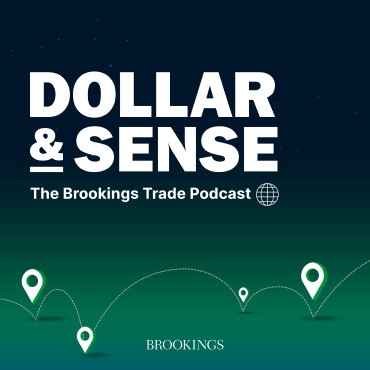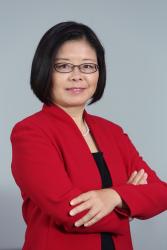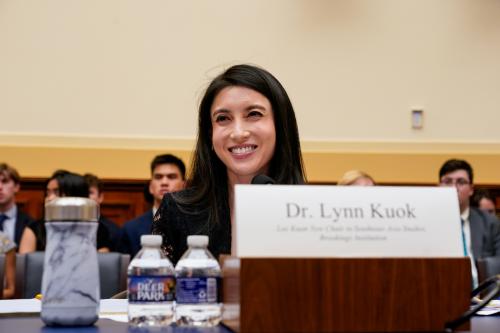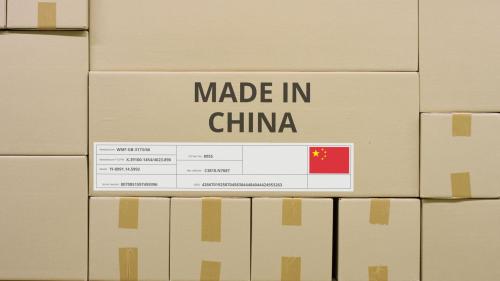Tao Wang, chief China economist for UBS Investment Bank in Hong Kong, discusses her new book, Making Sense of China’s Economy (Routledge). She describes market-oriented and land reforms that helped diminish China’s state role in the economy, increased foreign investment, and increased urbanization. “China understands,” she says, “that opening China’s economy, being integrated with the world, has been tremendously beneficial for the economy over the last 40 years.”
See also:
- Listen to Dollar & Sense on Apple, Spotify, Google, or wherever you like to get podcasts.
- Learn about other Brookings podcasts from the Brookings Podcast Network.
- Sign up for the podcasts newsletter for occasional updates on featured episodes and new shows.
- Send feedback email to [email protected].
TRANSCRIPT
[music]
DOLLAR: Hi, I’m David Dollar, host of the Brookings trade podcast Dollars and Sense. Today my guest is Tao Wang, the chief China economist for UBS Investment Bank in Hong Kong. Tao formerly worked for the IMF and she and I were neighbors in Beijing 15 years ago. She has a timely new book, Making Sense of China’s Economy. That’s what we’re going to be trying to do, making sense of China’s economy. It’s published by Routledge. Welcome to the show, Tao.
WANG: Thank you, David.
DOLLAR: So, let’s start with some of the basics. China started this economic reform program in 1978 and it’s had spectacular results. For outsiders, for people trying to understand China. What would you say are the two or three most important reforms that China introduced starting in 1978?
WANG: Well, there’s so many, but I think I would put probably the most important reform in the early days. Not exactly in ‘78, but around ‘80 is the Cultural Reform, which basically distributed the land back to the farmers for their use. And that allowed the farmers basically to decide what to produce and what to do. And so breaking away from that central planned system at the agriculture sector.
That was tremendous because the productivity went up and people were able to feed themselves and that released a lot of surplus labor from the agricultural sector that then went through this industrialization, urbanization stage. It also then really harnessed support for the reform, any political resistance and so on they realized, okay, you go this way, not the traditional Soviet model, and it actually revives the economy. So, I think that was the most important ones.
In the early days, also, I think opening to foreign trade a little bit, but establishing the special economic zones, also very important. It was not a big contributor to growth at the moment at that time, but I think that really brought in sort of foreign ideas, foreign investment, foreign management skills. And I think it really opened up, I think, the understandings of how things work in China.
And the third one, I think that’s really a more holistic set of market-oriented reforms starting in the early- to mid-nineties, because the earlier reforms were still things at the margin, not really touching ownership. And from the early- to mid-nineties, I think the understanding is that socialism can still have can have market and we should establish a market economy and encourage and allow private businesses to flourish and set up all the infrastructures that is compatible with a market economy. So, I think those are the most important ones in the early stage.
DOLLAR: Yeah. So, listening to you, Tao, it strikes me how important it is that these different reforms interact. So, the agricultural reform frees up labor, a lot of that moves to the cities. If you didn’t have a private sector developing and an export oriented sector developing, there wouldn’t have been jobs for them. Right? So, the way your different reforms that you highlight interact, that that strikes me as quite important.
WANG: Yes, indeed. I think that all comes together. So, these foreign companies coming to China, especially in the ’90, but also after WTO entry in the 2000s, that a lot of companies came to China for the cheap labor. And those labor was made available because of that agricultural reform and relaxation of the hukuo system so people can move about and go into the cities. And because of that market system, people also were able to buy food and buy things in the market. So, they didn’t need the distribution system from the government to function.
DOLLAR: Your book has chapters that focus on many of these important reforms individually. There’s a chapter on rural-urban migration. We were just discussing it a little bit and you mentioned the hukuo system. Could you go a little bit more into what this household registration system was, how rural urban-migration occurred nevertheless? And then if I could add a third part to that, what are the prospects going forward? Has everybody already moved from the countryside to the cities or is there prospect for further rural urban migration?
WANG: Sure. So, the household registration system, the hukuo system, is basically a household registration system and you are born with it and you get that hukou depending on where you’re born. And so the biggest discrepancy is between urban and rural. So with the hukou, with that registration, where you work, where you live, and what kind of entitlement you have was determined. In the old days that meant that if you are a rural hukuo and you have a piece of land and you get a grain distribution, but then you cannot function really in cities because cities, urban population were given these coupons and you can only buy grains and food using those coupons. So, if you are rural people, you cannot really survive because you are not part of the system.
So, I think in the early stages of the reform, after the agriculture reform, they eased it at the margin, they allowed people because there was also abundance of food, they didn’t have to rely so much on that coupon system, and that allowed people to go to the market and that freed up some of the labor.
And then people, of course, still couldn’t really get access to the same benefit as urban people. That’s why even today, we have 200 million plus workers called “migrant workers.” There are rural-urban migrants, but many of them have been working and living in cities for a long time, but they still do not have the same hukou, the same kind of identity, therefore not the same kind of entitlement.
So in the last 30 years or so—the mass migration really started in the late ‘80s—and in the last 30 years or so, you know, hundreds of millions of people have moved. Many of them, as I mentioned, have not been able to change their identity. And what that means is also that they do not have the same access to schools, and their kids’ education are inhibited to some extent. And so for many middle aged people, when they start to have kids, thinking about going to schools, colleges, where they have elderly parents, then they sometimes exit from the labor force.
So, hukou reform has been going on for some time at the margins. So, there’s a lot of relaxation, especially in lower-tier cities. But I think there is still some definitely some restrictions. So, if they can reform that, allowing people, enable people to move with their whole family, that’s going to help release some of the more labor still in the countryside. I mean, most people have moved, but still 25% of the employment is in the agricultural sector. And, OECD countries have 3 to 5%. And so China does not need that many people working in the agricultural sector, but they need to have job opportunities and also a conducive environment for them to move.
DOLLAR: I know that if you count the migrants as part of the urban population, China’s urbanization rate I think is about 62%, and other nearby densely populated Asian economies, it’s much more likely to be up above 80%. So, hopefully, well, there’s a good chance China will move in that direction. Certainly would create some more opportunities for people to move from the countryside to the city.
WANG: That’s right. And if you count only the hukou, then the urbanization rate is less than 50%. And so, that means that if you can give those people already in the cities their proper entitlement that will increase their confidence in the future and that can also boost consumption as well.
DOLLAR: One of the issues you cover is the property market and its relation to local government finance. I think this is a somewhat unique situation that China has. So, can you explain how the property market has worked and why is it now in the doldrums? It seems to really be in trouble.
WANG: Right. So, let me start with the land system in China. So, China’s land is divided into rural and urban. And so, rural land are collectively owned by the farmers and urban land are public, owned by the state. But for urban land to be used for urbanization or construction, it needs to first be procured, appropriated by the urban government and then go to the market and sell to developers or for industrial parks and so on.
So, in China’s rapid development this whole process, of course, meant that a lot of the farmland or rural land has a huge appreciation of value. And because they cannot directly go to the market, much of that appreciation was expropriated by local governments. So, they become very reliant on land sales in recent years. In the past, in the ‘80s and ‘90s, they mainly took the land and put out industrial parks and basically in some way subsidized industry, whether it’s state owned or foreign companies, they can enjoy very low land price. But recently is more about land sales and then they can use that money for infrastructure and so on.
So, in this process, local government was able to do a lot of infrastructure, but that means also they have very strong incentives to push up land price and property market and so on.
So, China’s property market has been in trouble. I think part of that is because there has been tremendous construction in the property sector and prices have gone up a lot. Some of that is of course—most of that, I would say—is because of China’s rapid growth and urbanization. There were strong demand and people had started with very limited living space and very poor quality living space. And there’s a lot of upgrade in demand. But part of that is also driven by this local government incentive to constrain or restrain land supply, push up the prices, and support the property market. So, the central government has been worried about property bubble and too much leverage going into the property sector, too much resources in the economy go in that sector for quite some time.
So, in 2021, the economy was recovering, property was very strong. So, the government decided to really try to deleverage in that sector. So, they put very restraining policies, really limiting credit to developers and also limiting mortgage and so on. And this coincided with a pandemic that lasted longer than anybody’s expectation. And China’s zero-COVID policy, which also lasted longer than most people expected. And so, that hurt the property market quite a lot.
So, now I think, we probably should expect some stabilization going forward because the big part of COVID policy and also policy tightening on property and that has been reversed and changed. But the fundamental issues that probably there has been a lot of building of properties and ownership is already very high, urbanization rate is slowing—those kind of factors are still there. So, we see a improvement, but probably we are not going back to the peak years.
DOLLAR: Thanks a lot, Tao, that was really clear. I hope the listeners appreciate that you’re the person I turn to when I’m trying to figure out what’s really going on the ground in the Chinese economy. It’s so complicated. So I appreciate that explanation. Following up on what’s happened in real estate and local government building a lot of infrastructure, you have a chapter called “How Serious Is the Debt Problem?” So, the obvious question is how serious is the debt problem?
WANG: Right. Yeah, so, I think China’s debt problem is very serious, but not necessarily in the ways that that a lot of people think. So, China’s debt to the real economy—what we call the real economy is government sector, household sector, corporate sector—is roughly 300% of GDP. There are a bit measurement issues, but almost all organizations kind of agree on that kind of number. So, it’s very high, it’s higher than any emerging market economies, higher than most developed economies. And so there has been predictions of China having a debt crisis for the last ten years or so. And yet China seems to have defied that prediction and debt just continue to go up, and we have not had a financial crisis or debt crisis.
So, the problem is not that China’s debt problem is not serious. I think it is serious. It has high levels of debt. There are mismatch issues in certain sectors like local government, certain corporate sector just have too much debt. The asset quality often is not very good. NPL ratio—the non-performing loan ratio—at times like now maybe quite a bit higher than what data suggest and so on. So, you have all this problems
But what sustained China’s credit cycle is really in the feature of China’s system, which is the debt is high but is financed 95% or more by domestic savings. China has very high saving rate and that’s largely kept with banks. And banks are predominantly state-owned. And so, first of all, the banks don’t really have that freedom to say we’re going to withdraw credit to companies that are not paying because the government will pressure them to continue to lend. And the second thing is that the depositors also have a lot of money and don’t really have alternative channels to go. China’s capital account is relatively controlled in terms of outflows. China welcomes inflows but discourages outflows. So, that money is sitting with banks and then banks are state owned. So, people have the confidence that the government will honor deposit. So, it’s the risk of a bank run or basically pulling the plug of liquidity is very low and we haven’t seen really that happen apart from at the edges.
So, these reasons make it very difficult, or reduces the risk or probability of a liquidity driven debt crisis. But that doesn’t mean it’s not serious because as I mentioned there are high levels of debt, some of these credit are invested in not so productive areas. So, there is definitely a efficiency problem and the debt is carried in the system. Some of this excess capacities are not cleared out. You can say that’s good for social stability, but on the bad side it’s not good for productivity, it’s not good for investment that needs credit and credit are stuck with some areas that are a bit of a waste or stagnant areas.
DOLLAR: A key part of that analysis, Tao, it seems to me, is that closed capital account in the fact that people cannot easily move money, especially out of the country. Do you see that weakening over time? We live in a really complicated world, there must be a lot of ways to get money out of China. So, are those capital controls somewhat at risk and is that a potential source for a financial crisis?
WANG: Yeah, so, capital account controls can never be watertight. So, over the years, there’s substantial leakage. And so, you can see from China’s huge trade surplus and inflows and yet the reserves hardly change for a long time. So, then the underlying capital flows is still there.
But that said, I think they are largely effective so far in preventing sudden and institutional outflows. For individuals, if you can stomach some of the costs of underground and so on, there are ways definitely to take money. And for some corporate also there’s ways to do it through trade, or through IPO capital market, and so on, you can.
Before 2015, between 2010, 2015 China de facto lose the capital accounts a lot of money. But at that time, China was growing, the exchange rate was appreciating. So, you didn’t have a lot of outflow. But then in 2015, suddenly the economy was slowing down and the currency was facing pressure. Suddenly there were huge outflows and China lost about a trillion dollar reserves that year. After that, then the government tightened controls on outflows again.
So, so far I think that’s working okay, but it does constrain future development. If China talks about RMB internationalization, for example, that requires a more open capital account. And I think that the financial issues, the concerns about liquidity and stability, is going to constrain that speed of capital account opening or RMB internationalization. Also, the debt level is going to also constrain monetary policy in terms of interest rate, how high can you push it up and so on.
DOLLAR: That’s an excellent point that a lot of this talk globally about RMB internationalization is way out ahead of reality. And you really have to open the capital account pretty radically for the yuan, the renminbi, to become a major reserve currency, settlement currency.
Let’s turn to the issue of state enterprises. Even with all the market reforms, China still has a large state enterprise sector. You cover that in the book. In the West, there’s a perception that Xi Jinping is shifting the weight of support toward state enterprises, away from private firms. What’s the reality here?
WANG: Well, so, the reality is that it’s true that China’s state sector, the presence of the state, is definitely higher than other countries. And as of now, the last point of data is still pre-pandemic, but the state sector roughly accounts for 30 to 40% of the economy, which is very high. But of course, that has come down from the early ‘80s where it’s over 90%.
But the good thing and the bad thing is, so despite the talk that China’s moving away from the from the private sector, that talk has been going on for the last ten years or so. But the share of state ownership in the economy has not really changed that much in the last decade. So, it’s not the case that they just steadily goes up. But the bad thing is that they also do not decline anymore. It’s stuck there.
So, the other thing about the state presence, I think it’s probably more felt in not in the ownership, but in the way the government is managing the economy. Even though the government talks about letting the market be playing a dominant role in resource allocation, but in reality, I think the government still have a lot to say in terms of where to allocate capital, where to allocate land, those kind of productive sources. The reform has been relatively slow in that area.
And more recently, I think the government has also increased its presence in public services, in regulations, regulating the market, and so on. Some areas I think it’s needed because there were no regulation. So, from whether it’s from a social or financial risk point of view, they needed that. But I think it was very concentrated in a very short period of time. All this came out without a lot of consultation and forewarning. And so, I think that that gives people impression that on one hand you are increasing the role of the state, on the other hand, you are not exiting from certain sectors the state said that it was going to. So, I can understand that impression. But I think in reality the state ownership has not really increased.
The good thing, I guess I’m an optimist, the good thing is that at the 20th Party Congress, the work report from President Xi reiterated that the Party still wants to move on the market orientation. Still reiterated the unwavering support to the private sector and so on. I mean, it may take some time for private businesses to be fully convinced, but I think at least they acknowledge that it’s very important to sustain growth in the future, and they’re trying to work in that area.
DOLLAR: A related impression in the West is that Xi Jinping is closing the Chinese economy to some extent, moving away from open trade and open investment. On the other hand, China is one of the forces behind the Regional Comprehensive Economic Partnership. It’s actually opened up some new sectors for direct investments like auto and financial services where your company is. How do you see the openness in the Chinese economy? Can you characterize it as going more open or less open?
WANG: Well, I think indeed, the evidence, whether it’s on trade or on investment or on these regional trade agreement and so on does not support that China wants to be more closed or are moving towards a more closed policy. Actually, I think if there’s one thing there’s more consensus within the system than other parts of reform is keep the economy open. And again, the Party Congress report mentioned that. But the fact is also I think China understands that opening China’s economy, being integrated with the world, has been tremendously beneficial for the economy over the last 40 years.
And that also is a key part when they talk about security and so on, is a key part of the security. China still depends a lot on imported components and technology resources and knowhow and so on. And China is no longer so dependent on exports, but exports nevertheless has been an important driver of growth. The export sector tend to be the more competitive sector in the economy, the domestic-oriented are less so. So, I think there’s strong support in that.
Of course there is the internal circulation, dual circulation thing, which many people interpreted as China’s more inward looking. For me, I think that’s more of a defensive position, a realization that the outside environment is no longer so welcoming and there is risk of disruptions on the supply side if the U.S. and others cut off certain supplies of key components and so on. So, there’s definitely a increased focus on supply chain security, self-reliance.
But I think that’s not a proactive move, it’s more of trying to reduce the vulnerability. It’s hoping for the best, but preparing for the worst that China is still hoping to open. So, that’s why China is quite active negotiating with regional, with Europeans, and trying to get things done.
But at the same time, I think there is definitely a increased sense of security issue. So, you mentioned financial services, automobiles, and other manufacturing and so on, China has made the move of more open even during the pandemic period after trade war. But in other areas, I can also see that China probably will become more guarded. So, this will be related to ideology, content, communication, those kind of things that it thinks it needs to focus on security issues.
DOLLAR: As a last question, Tao, if it’s okay with you, I’d like to ask you a more personal question. The economic reform and the developments, what does this all mean for your generation?
WANG: Yeah, for my generation, I think we are the biggest beneficiary of reform and opening. Right? So, I grew up with everything required a coupon. And each person is able to get half a pound of pork per month and you cannot easily move and so on. Even when I was in college, I witnessed this suddenly abundance of things of being available in the market, and market it appeared. And then that opening policy immediately directly contributed to my having an opportunity to study abroad, working for a foreign company.
So, it’s hugely personal. So, it’s not just the numbers. Also my relatives used to work in the countryside and have to worry about the food availability and now they are by no means having high level jobs, but they are able to afford a home, and a car, and so on. So, I think the reform and the opening has really completely changed the landscape, not just the economy, but also society.
DOLLAR: In 1986, Tao, I was teaching in Beijing and I was actually part of a Chinese work unit, danwei, and things were breaking down, the planning system, but I had to get a coupon, I know exactly what you’re talking about, I had to get a coupon to buy a Flying Pigeon bicycle, which was the most popular fieger bicycle. And so I jumped the queue in my work unit because I was only going to be there for one semester. And lots of people hated me. You know, It’s like, why is this foreigner jumping the queue? Just gave me a little tiny insight into the some of the mechanics of planned system and what it can do to interpersonal relations.
WANG: Yes. And also, I think just, you know, writing this book, one thing is when people talk about the success of China, the reasons for the success of China’s economy, there are many explanations. But I think recently there has been some voices about the advantage of the Chinese system, which seems to be a lot of state involvement and industrial policy, state control. And I with the book, I also wanted to remind people that China started with 100% state control. That’s not what drove China’s success. Right? And it’s precisely moving away from that that led to the success, the market, the competition, and giving people freedom to choose, and now all of that.
DOLLAR: I think that’s a great ending. Tao. I’m David Dollar and I’ve been talking to UBS economist Tao Wang. She’s trying to make sense of the Chinese economy, she obviously understands it really well. And thank you for helping us understand the reality.
WANG: Thank you so much. It’s my honor.
DOLLAR: Thank you all for listening. We release new episodes of Dollar and Sense every other week. So, if you haven’t already, follow us wherever you get podcasts and stay tuned.
[music]
It’s made possible by support from supervising producer Kuwilileni Hauwanga; producer Fred Dews; audio engineer Gastón Reboredo; and other Brookings colleagues. Show art is by Katie Merris.
If you have questions about the show or episode suggestions, you can email us at Podcasts at Brookings dot edu. Dollar and Sense is part of the Brookings Podcast Network. Find more podcasts on our website, Brookings dot edu slash Podcasts.
Until next time, I’m David Dollar and this has been Dollar and Sense.
The Brookings Institution is committed to quality, independence, and impact.
We are supported by a diverse array of funders. In line with our values and policies, each Brookings publication represents the sole views of its author(s).







Commentary
PodcastMaking sense of China’s economy
May 1, 2023
Listen on
Dollar and Sense Podcast